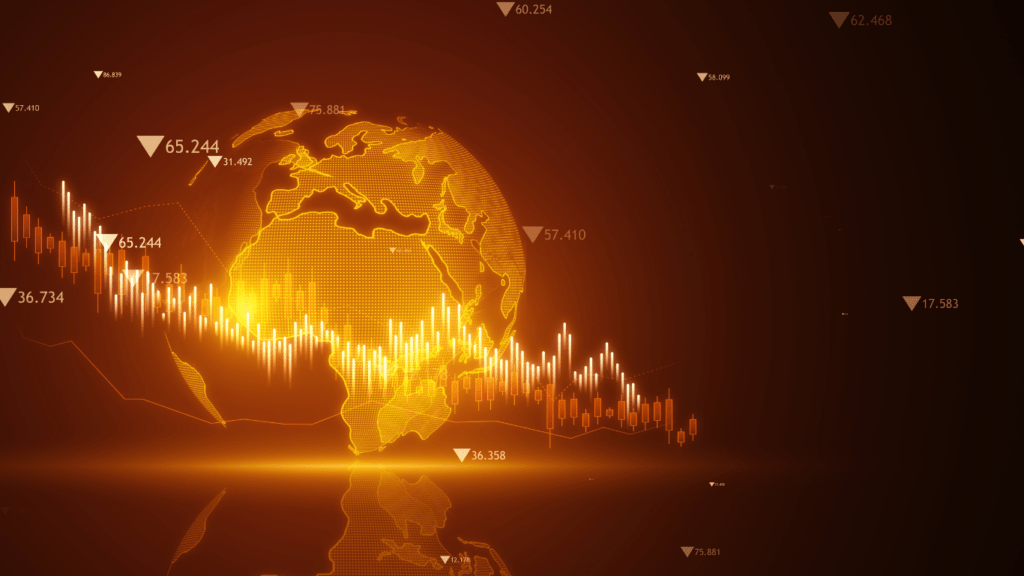Overview of the Global Economy
The global economy consists of interconnected markets influencing finance globally. Several key factors impact how the economy functions and evolves. These include international trade, inflation rates, currency exchange rates, and geopolitical stability.
- International Trade: International trade involves the exchange of goods and services across borders. It’s regulated by trade agreements and tariffs, impacting global supply and demand. For example, a trade agreement between the US and China can shift the balance of imports and exports, affecting domestic prices.
- Inflation Rates: Inflation refers to the rate at which the general level of prices for goods and services rises. Central banks, like the Federal Reserve, monitor and control inflation through monetary policy. High inflation reduces purchasing power, whereas low inflation can signal economic stagnation.
- Currency Exchange Rates: Exchange rates determine the value of one currency relative to another. They fluctuate based on market dynamics, interest rates, and economic indicators. Travelers and businesses operating internationally must pay close attention to these rates, as they affect costs and revenues.
- Geopolitical Stability: Political conditions in countries can influence economic performance. Stable geopolitics ensure a predictable environment for trade and investment, while conflicts and unstable governments can disrupt markets. For instance, sanctions on specific nations can lead to supply chain interruptions.
Understanding these factors helps individuals better navigate financial decisions in a complex global market.
Key Factors Influencing the Global Economy
Several factors shape our global economic landscape and directly impact personal finances.
Trade Policies
Trade policies determine the flow of goods and services between countries. Agreements, tariffs, and trade barriers significantly influence global trade by either facilitating smooth transactions or creating hurdles. For instance, free trade agreements can reduce costs for imported goods, benefiting consumers. On the other hand, tariffs can lead to higher prices for certain products, affecting everyday purchases.
Currency Exchange Rates
Currency exchange rates play a crucial role in international trade and travel. Fluctuations in exchange rates impact the cost of imported goods and services, affecting both businesses and consumers. A strong domestic currency makes imports cheaper and exports more expensive. Conversely, a weak currency can benefit exporters while increasing the cost of imports. Travelers also experience these effects when changing money for international trips.
Global Supply Chains
Global supply chains connect various stages of production and distribution across countries. Disruptions in these chains, such as natural disasters or political conflicts, can lead to shortages and price hikes. Efficient and stable supply chains ensure the steady availability of products, helping maintain price stability. For example, the COVID-19 pandemic caused significant disruptions in global supply chains, leading to increased costs and limited product availability in many sectors.
International Market Trends
International market trends reflect the economic health and consumer behavior across different regions. These trends, driven by technological advancements, cultural shifts, and economic policies, influence investment opportunities and consumer choices. For example, a growing middle class in emerging markets can drive demand for luxury goods, affecting global trade patterns. Staying informed about international market trends allows individuals to make better investment and financial decisions.
Economic Indicators That Affect Personal Finances
Economic indicators play a crucial role in shaping personal finances. Understanding these can help you make informed decisions about saving, investing, and spending.
Inflation Rates
Inflation rates measure the rate at which the general level of prices for goods and services is rising. When inflation is high, the purchasing power of money decreases. For example, if inflation grows 2% annually, items costing $100 now will cost $102 next year. The Consumer Price Index (CPI) often tracks this change, reflecting the average change over time in the prices paid by urban consumers for a market basket of consumer goods and services.
Interest Rates

Interest rates, set by central banks like the Federal Reserve, influence borrowing and saving activities. Higher interest rates make loans more expensive but offer better returns on savings accounts. For instance, when the Federal Reserve increases interest rates, mortgage rates typically rise, making home buying more costly. Conversely, savings accounts might yield higher returns, encouraging more saving.
Unemployment Rates
Unemployment rates represent the percentage of the labor force that is jobless and actively seeking employment. Higher unemployment rates can signal economic distress and impact personal finances by reducing disposable income and increasing financial insecurity. For example, an unemployment rate of 8% suggests that 8 out of every 100 people in the labor force are without jobs, which can lower consumer spending and slow economic growth.
Gross Domestic Product (GDP)
Gross Domestic Product (GDP) measures the total value of all goods and services produced over a specific time period within a country. A growing GDP indicates a healthy economy, which can positively impact personal finances through job creation and higher wages. For instance, if the GDP grows by 3% yearly, the economy is expanding, likely leading to better employment opportunities and wage increases. Conversely, a declining GDP can signal economic trouble, affecting income stability and financial planning.
These economic indicators provide valuable insights into the overall economic climate and guide personal financial strategies effectively.
Regional Economic Differences
Regional economic differences shape the global economy and influence individual financial decisions in diverse ways. I’ll explore the various impacts across developed countries, emerging markets, and developing nations.
Developed Countries
Developed countries, like the US, Japan, and Germany, drive global economic growth through technological advancements, high GDP, and stable financial markets. They typically have mature industries, robust infrastructure, and high-income levels. For instance, the US’s tech industry leads innovation and significantly impacts global markets.
- Technological Advancements: Developed countries often lead in technological innovation, boosting productivity and economic growth.
- Stable Financial Markets: Mature financial systems in these countries attract global investments, ensuring liquidity and stability.
- High-Income Levels: Residents in developed countries generally enjoy higher incomes and better living standards, affecting consumer spending patterns.
Emerging Markets
Emerging markets, such as China, India, and Brazil, display rapid economic growth and industrialization. They offer investment opportunities due to their expanding middle class and increasing consumption rates. However, these markets can be volatile due to political instability and regulatory changes.
- Rapid Growth: Emerging markets experience fast-paced economic expansion, increasing their influence on the global stage.
- Investment Opportunities: Growing economies attract foreign investments, driven by prospects of high returns.
- Volatility: Political instability and regulatory uncertainties can lead to market fluctuations and financial risks.
Developing Nations
Developing nations, including several African and Asian countries, face challenges like poverty, inadequate infrastructure, and political instability. Despite these obstacles, they have growth potential due to resource availability and demographic dividends.
- Growth Potential: Developing nations hold significant growth prospects due to untapped resources and young populations.
- Challenges: Issues such as poverty, limited access to education, and healthcare hinder economic progress.
- Resource Availability: Abundant natural resources in these regions can drive future economic growth if sustainably managed.
Regional economic differences affect financial decisions on a personal and global scale, shaping everything from investment choices to consumer behavior. Understanding these distinct economic landscapes enhances one’s ability to navigate the complexities of the global economy.
How Geopolitical Events Impact Your Finances
Geopolitical events can have a profound effect on your financial well-being. Key factors include trade wars, political stability, and international agreements.
Trade Wars
Trade wars, disputes between countries imposing tariffs or quotas on each other’s goods, disrupt global supply chains. For instance, during the US-China trade war, tariffs on electronics and agricultural products raised costs, impacting consumer prices and investments. Higher import costs can reduce profit margins for businesses and lead to higher prices for consumers. Companies may shift sourcing or production locations, adding expenses that affect stock prices and investment portfolios.
Political Stability
Political stability affects currency values, investment climates, and economic policies. In stable countries like Germany or Japan, consistent policies and strong legal frameworks encourage investment and economic growth. Conversely, instability, such as in Venezuela or parts of the Middle East, creates uncertainty, triggering capital flight and currency devaluation. Investments in nations experiencing turmoil often become riskier, while stable environments attract long-term foreign investments, contributing positively to personal financial planning and savings.
International Agreements
International agreements, such as trade deals and climate accords, shape global economic dynamics. Agreements like the North American Free Trade Agreement (NAFTA) reduce barriers, facilitating trade and investment between member countries. Consumers benefit from lower prices and expanded product choices, while businesses gain access to larger markets. Climate agreements may mandate industry changes, influencing energy prices and creating new investment opportunities in renewable energy sectors. Understanding these agreements helps navigate potential shifts in market trends and economic conditions, informing decisions on investments and expenditures.
Strategies to Protect Your Finances
The global economy’s complexity can make financial planning challenging. Implementing robust strategies can safeguard your finances from unpredictable economic shifts.
Diversification
Diversifying your investment portfolio spreads risk across various asset classes. Stocks, bonds, and real estate offer different risk-return profiles. For example, stock market investments may yield high returns but come with volatility, whereas bonds provide stable income with lower risk. Real estate investments can offer both income and appreciation potential. By diversifying, I reduce exposure to any single asset’s poor performance.
Savings and Investment Options
Maintaining a mix of savings and investment options ensures liquidity and growth. High-yield savings accounts offer higher interest rates compared to traditional savings accounts, helping my funds grow faster while remaining accessible. Certificates of Deposit (CDs), though less liquid, provide guaranteed returns over specified periods. Contributing to retirement accounts like 401(k)s or IRAs also offers tax advantages, protecting my financial future.
Staying Informed
Staying informed about global economic trends enables proactive financial adjustments. Regularly checking economic indicators like inflation, GDP growth, and employment rates helps me predict market movements. Following credible financial news sources keeps me updated on international trade developments and geopolitical events that impact the economy. Knowledge empowers me to make timely decisions, whether it’s adjusting my investment strategy or reallocating my savings.
By adopting these strategies, I can better navigate the complexities of the global economy and protect my financial well-being.


 David Boyd brought valuable insights to News Flip Network, contributing his knowledge in business and technology. His work on streamlining the site’s interface and optimizing backend processes ensured that the platform operates efficiently. Boyd's efforts in integrating advanced tools and managing technical aspects played a significant role in the site's reliable and timely news delivery.
David Boyd brought valuable insights to News Flip Network, contributing his knowledge in business and technology. His work on streamlining the site’s interface and optimizing backend processes ensured that the platform operates efficiently. Boyd's efforts in integrating advanced tools and managing technical aspects played a significant role in the site's reliable and timely news delivery.